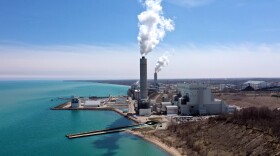When Taiwanese planes belonging to Foxconn representatives landed at Milwaukee's General Mitchell Airport last week, Journal Sentinel reporter John Schmid took notice. Since President Trump's allusions to Foxconn negotiations in June, he has been following the trail left by Wisconsin politicians, economic officials and the Asian technology manufacturer.
In short, he says nothing has been decided yet. There might be a mega manufacturing plant coming to Wisconsin. It might be in Racine County. And according to one official close to Governor Scott Walker, it might bring up to 10,000 jobs to the area. But Schmid says these wouldn't be your father's manufacturing jobs if the rumors are true. His reporting suggests that this "smart factory" has the potential to transform the Wisconsin manufacturing industry - which has been slow in the last decade.
"If you are a classic lunch pail, blue collar, you know, metalworker from the last century, you would not be able to recognize these nice clean, quiet factory floors that are highly productive, highly automated, that are becoming the norm," Schmid says.
"You'd be talking of course about federal subsidies: what can Congress and the White House bring to this package?"
In addition to being different types of industrial jobs, Schmid says Foxconn is likely to expect a large package of subsidies from the U.S. government. In China, the tech company receives land to develop at practically no cost as well as subsidies for wages, which are infamous for being as low as 1.80 U.S. dollars an hour.
So as Foxconn looks to expand to the United States, which is a significantly higher-cost and higher-regulated industry, Schmid says the company would seek tax breaks and subsidies comparable to their foreign plants.
"You'd be talking of course about federal subsidies: what can Congress and the White House bring to this package? State subsidies: what can Madison's politicians bring, what can Racine County bring, what kind of job training is going to go into this, what kind of infrastructure would be built," Schmid says.
"There's a clear sentiment that can be sort of, activated and stirred in the current political environment that thinks that if you have fewer trade agreements if you have more closed borders it will protect U.S. jobs."
Schmid says what he sees in Foxconn is a form of globalization in reverse. In the current political climate which seems to be anti-trade and narrowly focused on American-made products, the Foxconn plant would be bringing in large foreign investments in order to create products traditionally made overseas.
"There's a clear sentiment that can be sort of, activated and stirred in the current political environment that thinks that if you have fewer trade agreements if you have more closed borders it will protect U.S. jobs," Schmid explains.
He says it's clear that although no formal announcement has been made, the draw of 10,000 new-age jobs in a traditional rust belt city like Milwaukee is great for politicians. In a recent article, he wrote that "politicians continuously draft new legislation based on nostalgic hopes of a less complicated era. In that process, they perpetuate expectations that are outdated and unrealistic."
"They are still time frozen in the last century when it comes to understanding what manufacturing is. They haven't accounted for the kind of skills Foxconn would bring, the kind of jolt that is necessary."
Politicians in Wisconsin have not hesitated in picking up the Foxconn story. Paul Ryan says he met with Foxconn earlier this month to discuss the potential development, and Schmid says that is characteristic of politicians in aiming for job creation.
"Well can you imagine the ribbon cutting," Schmid asks.
But the rumors of a Foxconn plant can only go so far. As Schmid has discovered in his reporting, the manufacturing industry and its workers are changing. New technology jobs in an automated factory would mean a large re-training program for employees and a need for higher educated candidates with global perspectives. Schmid references a Congressional Research Service document written by Marc Levinson when saying that is a lot to ask of the current perception of manufacturing.
"They are still time frozen in the last century when it comes to understanding what manufacturing is. They haven't accounted for the kind of skills Foxconn would bring, the kind of jolt that is necessary," Schmid says.





